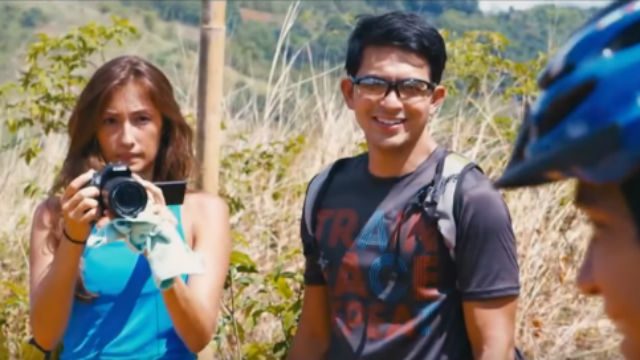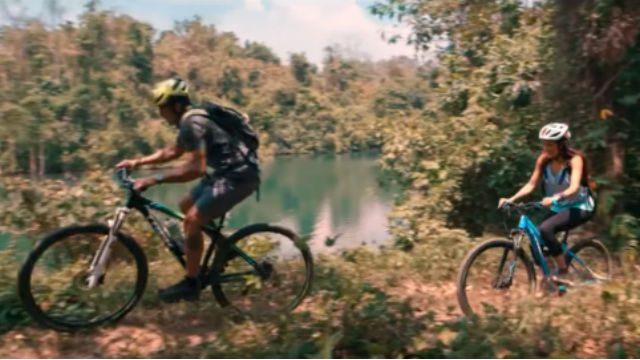SUMMARY
This is AI generated summarization, which may have errors. For context, always refer to the full article.

MANILA, Philippines – In Lakbay2Love, 3 friends traverse diverse cycling routes, whether together, individually, or occasionally coupling up as (once or future) romantic partners or bromantic buddies.
In the end we realize, contrary to the usual expectations in romantic comedies, that where they wind up (in their travels as well as their relationships) does not matter as much as the journey they took – which, in a sense, does not really end either. Ellen Ongkeko-Marfil, the film’s director, co-writer, and producer, has made her latest in a shortish string of advocacy projects, but one that resonates with a recognizably personal choice. (IN PHOTOS: Solenn Heussaff, Dennis Trillo hop on bikes to lead outdoor movie event)
Significantly older than the typical indie filmmaker, Ongkeko-Marfil’s directorial filmography begins with the current millennium, after intensive preparation with some of the most celebrated Second Golden Age talents – Ishmael Bernal, Lino Brocka, Mike de Leon, and so on.
Like these older names, formal film-school preparation was then-unavailable to her, so she honed her skills in literature and theater arts, in addition to the nitty-gritty of production work; also like the earlier talents, she emerged at a comparatively advanced age, but with a useful aesthetic and social philosophy that only required further refining as she went along.
At this point, a personal disclosure should be in order: Ongkeko-Marfil has become a close enough friend who, at one point, solicited my opinion regarding the current film’s material. This may be the occasion for me to point out some reservations I had with Lakbay2Love, especially in relation to her previous work, Boses (2008). Lakbay2Love, as I mentioned earlier, appears to be a more intensely personal project, and therefore its appeal might be more specific.
The local biking community, which deserves to expand rapidly as a matter of survival, would be its most enthusiastic supporters; female (and feminine) audiences would appreciate its consistent focus on a woman, and mixed families would be able to relate to this female character’s mother working abroad and her non-Filipino father raising another family; nature lovers would probably be pleasantly surprised to discover a number of accessible scenic spots in the metropolis as well as in the rest of the country.

This is not to say that Lakbay2Love leaves out everyone else who happens to fall outside its overlapping spheres of interest. Boses took on a social problem, child abuse and rehabilitation, which might already be extant in a system where uneven development, overpopulation, and overseas labor prove to be too stressful for indigent families.
In contrast, Lakbay2Love operates with a similar social critique – this time of traffic congestion, administrative incompetence, and corrupt stewardship of environmental resources – but foregrounds an individually viable solution via the rejection of fossil-fuel consumption, and uses a woman’s romantic dilemma as a way of suggesting that such a solution may be readily available, but will nevertheless require profound personal adjustments.

This also helps explain why local critical reception has been divided along lines that appear to be premised on class but in fact turn on gender difference. I had initially attempted to develop an argument that would explain why I felt excluded by the film-text, but the unmistakable presence of a rural working-class major character nullified this impression. When certain reviewers started whining about Lakbay2Love’s digressive developments, open ending, and frank acknowledgment of audience pleasure, I realized that I was similarly on the verge of capitulating to standard high-art fanboy prescriptions.
In fact, as I had to admit later, the film operates best as a cinematic attempt at écriture féminine or womanly expression, in its valuation of feminine difference and upholding of the woman’s body and prerogatives.

In fact, when inspected more closely, Lakbay2Love does not even push for biking as a preferable option at the expense of all other modes of transportation; what it advocates for is environmental awareness, where biking happens to be the most feasible means of exploration, but not the only one.
This is paralleled in the narrative by the choices Lianne, the central character, has to face: to move forward with JR, her beau ideal, whose ambition requires the pursuit of global assistance (a loss she might have to learn to accept); or to reconcile with Macky, her ex, who maintains as much cordiality with her as his wounded pride could allow, and who, like her, idolizes JR. Like the environmental question, Lianne learns by trial and error how to maintain her equanimity with these demands on her time and attention.

Most responses to Lakbay2Love have remarked on the ravishing natural scenery, captured by careful, documentary-like cinematography complemented with occasional graphic enhancements. What will impress more consistent observers of current local film is the transformation effected by Solenn Heussaff, who plays Lianne with an expertly calibrated mix of pain, naïveté, and desire, with an undercurrent of melancholy, instead of her earlier sexy-flighty persona.
The histrionic fireworks of the JR performer, Dennis Trillo, will no longer be news, but the fewer appearances of Kit Thompson (as Macky) will definitely have observers awaiting his next roles; the male performers are given their now-expected beefcake scenes, but Heussaff holds her own beside them, and the luxuriant beauty of the Philippine tropics takes its inescapable diva-level star turn.

Lakbay2Love will prove rewarding for those seeking out an early Valentine’s treat; be warned however that its nature scenes might wind up fostering a long-term crush, if not a permanent love affair, with the environment that we have long taken for granted. – Rappler.com
Joel David is Professor of Cultural Studies at Inha University in Incheon, Korea. He is the author of a number of books on Philippine cinema and was founding Director of the University of the Philippines Film Institute. He maintains an archival blog, Amauteurish!.
Add a comment
How does this make you feel?
There are no comments yet. Add your comment to start the conversation.